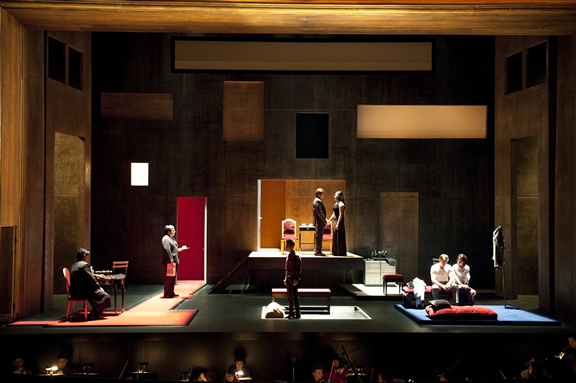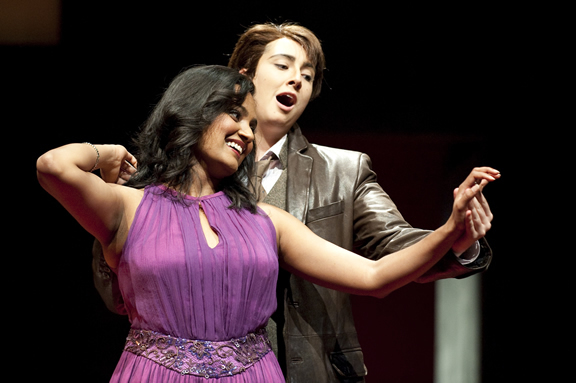Other Links
Editorial Board
-
Editor - Bill Kenny
- Founder - Len Mullenger
Google Site Search
SEEN AND HEARD
INTERNATIONAL OPERA REVIEW
Handel, Ariodante:
Featuring singers from Juilliard's
Vocal Arts Program and the Juilliard Orchestra. Juilliard's Peter Jay
Sharp Theater, New York, 11.11.2009 (SSM) Director:
Stephen Wadsworth
.
I
do, though, have to question some of the staging decisions. For most
of the opera, characters who should have been offstage were onstage.
Sometimes this worked, as in the ending of Act 2 where the cast
posed supinely, as if on a canvas, in despair. At other times it
seemed inconsistent, one character seemingly invisible, the next one
part of the action. In Act 2, the King sits at a desk, stage left,
with his back to the audience, not part of the action, turning his
head to the characters (at least once) for no purpose that I can see.
The lighting, as well, could have been synchronized a bit more; it became at times brighter or darker for no apparent reason. Photos: Courtesy of Nan Melville.
Conductor:
Gary Thor Wedow
Set
Designer: Derek McLane
Costume
Designer: Ann Hould-Ward
Lighting
Designer: David Lander
Cast:
Ariodante:
Cecelia Hall
Ginevra:
Tharanga Goonetilleke
Dalinda:
Haeran Hong
Polinesso:
Anthony Roth Costanzo
Lurcanio:
Nicholas Coppolo
Re,
King of Scotland: Shenyang
Odoardo:
Javier Ernesto Bernardo
Ariodante was Handel's first opera written to be performed at the new theater
in Covent Garden. Having lost most of his soloists to the
politically correct, royally supported, Opera of the Nobility, he
adeptly managed to lure the the castrato Carestini from the
Continent. Carestini was rumored to have complained that some of the
arias Handel had written for him did not do justice to his abilities.
This,
then, is no opera for amateurs, and none were to be found in last
night's performance by the singers and orchestra of the Juilliard
School. From the opening arioso, sensitively performed by Tharanga
Goonetilleke, I knew that although I was in a school, this would be
no simple student production. The cast sang and performed with great
maturity and self-confidence. There may have been first night
jitters, but none that I could see. Done in modern dress with a
simple setting, there was no attempt to show that Handel somehow
needed to be updated or made relevant to be enjoyed. I shuddered for
a moment when Ariodante, admirably sung and acted by Cecielia Hall,
grabbed what I thought was a cell phone from her (his?) pocket, only
to be relieved when I realized that it was really an engagement-ring
box.

Full Cast Juilliard School's Peter Jay Sharp Theatre
The
plot itself is indistinguishable, for me at least, from a half dozen
or so other Handel operas that come to mind. Lovers declare their
fidelity which in some way is questioned or tested by an
incident involving a disguised character. Confusion and/or despair
ensue. The truth is finally revealed and the characters are happily
reunited. For the opera to be successful, the singing must be
compelling when the plot isn't. The program notes state that “We
have retained all the arias but two...so as to show off our singers.”
This performance was, if anything, about singing. There was no fear
by any of the performers in tackling some ticklishly difficult arias.
Countertenor Anthony Roth Costanzo as Polinesso, in a role often
played by a mezzo,
successfully negotiated the Act 3 aria Dover,
giustizia, amor, which is challenging
even for the best mezzo. Kudos,
too, to Cecelia Hall in managing to make the roulades in the Act I
aria Con l'ali di costanza seem
easy.
Period
performance devotees, myself included, might question the leisurely
tempi of some of the arias, but not the piercingly beautiful
centerpiece aria, Ariodante's Scherza infida in grembo al drudo. It could have gone on forever. The conductor and, notably, the
bassoonist, handled the accompaniment with great sensitivity. In
general the orchestral playing was excellent. Realizing that this
performance was meant to be a showcase for the singers, the conductor
tried to make sure that the orchestra never overwhelmed the singers, and they
rarely did . Other members of the cast were also outstanding. Haeren
Hong as Dalinda was expressive in both singing and acting, able to
swing naturally from the alluring to the repentant. Shenyang as the
king performed with convincing gravitas. Nicholas Coppolo made
Lurcanio, next to Odoardo the least interesting character, in the
opera, believable. Special praise should go to his performance of the
difficult Act 2 aria Il tuo sangue, ed il tuo zelo.

Tharanga Goonetilleke as Ginevra and Cecelia Hall as Ariodante
Minor
caveats, though, for a wonderful production.
If
you're in the NY area, there are two more performances: Friday,
November 13th at 8 PM, with a Sunday matinee on November 15th at 2 PM. Go see
it.
One
final question asked of me by my opera buddy. If one feels compelled to shout
something out after each aria, does one yell “Bravo” or
“Brava” to a performer in a trouser
role? My answer would be “Bravi,” but only at the end of
the performance.
Stan
Metzger
